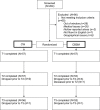Does a community-based stress management intervention affect psychological adaptation among underserved black breast cancer survivors?
- PMID: 25749598
- PMCID: PMC4411537
- DOI: 10.1093/jncimonographs/lgu032
Does a community-based stress management intervention affect psychological adaptation among underserved black breast cancer survivors?
Abstract
Background: In this randomized trial, Project CARE, we examined whether participation in a cognitive-behavioral stress management and breast cancer wellness and education program improved psychological outcomes among a sample of underserved black breast cancer survivors.
Methods: Both complementary medicine interventions were 10-sessions, manualized, group-based, and were culturally adapted for black women in the community from evidence-based interventions. Participants were 114 black women (mean age = 51.1, 27-77 years) who had completed breast cancer treatment 0-12 months before enrollment (stages 0-IV, mean time since cancer diagnosis = 14.1 months). Women were enrolled upon completion of curative treatment (ie, surgical, chemotherapy, radiation oncology) and randomized to receive cognitive-behavioral stress management or cancer wellness and education program.
Results: There was a remarkable 95% retention rate from baseline to 6-month follow-up. Participants in both conditions showed statistically significant improvement on indices of psychological well-being, including overall quality of life (Functional Assessment of Cancer Therapy-Breast), intrusive thoughts (Impact of Event Scale-Revised), depressive symptoms (Center for Epidemiologic Studies-Depression), and stress levels (Perceived Stress Scale) over the 6-month postintervention follow-up (all repeated measures analysis of variance within-subjects time effects: P < .05, except for overall mood; Profile of Mood States-Short Version). Contrary to hypotheses, however, condition × time effects were not statistically significant.
Conclusions: Findings suggest that improvements in multiple measures over time may have been due to intensive training in stress management, extensive provision of breast cancer information, or participation in an ongoing supportive group of individuals from a similar racial background. Implications bear on decisions about appropriate control groups, the timing of intervention delivery during the treatment trajectory, and perceived support from the research team.
© The Author 2014. Published by Oxford University Press. All rights reserved. For Permissions, please e-mail: journals.permissions@oup.com.
Figures




Similar articles
-
Home-based multidimensional survivorship programmes for breast cancer survivors.Cochrane Database Syst Rev. 2017 Aug 24;8(8):CD011152. doi: 10.1002/14651858.CD011152.pub2. Cochrane Database Syst Rev. 2017. PMID: 28836379 Free PMC article. Review.
-
Contemplative self healing in women breast cancer survivors: a pilot study in underserved minority women shows improvement in quality of life and reduced stress.BMC Complement Altern Med. 2014 Sep 23;14:349. doi: 10.1186/1472-6882-14-349. BMC Complement Altern Med. 2014. PMID: 25249005 Free PMC article. Clinical Trial.
-
Psychosocial interventions addressing the needs of Black women diagnosed with breast cancer: a review of the current landscape.Psychooncology. 2015 May;24(5):497-507. doi: 10.1002/pon.3620. Epub 2014 Jul 17. Psychooncology. 2015. PMID: 25045105 Free PMC article. Review.
-
Effects of an expressive writing intervention on cancer-related distress in Danish breast cancer survivors - results from a nationwide randomized clinical trial.Psychooncology. 2013 Jul;22(7):1492-500. doi: 10.1002/pon.3193. Epub 2012 Sep 19. Psychooncology. 2013. PMID: 22991162 Clinical Trial.
-
Outcomes of an uncertainty management intervention in younger African American and Caucasian breast cancer survivors.Oncol Nurs Forum. 2013 Jan;40(1):82-92. doi: 10.1188/13.ONF.82-92. Oncol Nurs Forum. 2013. PMID: 23269773 Clinical Trial.
Cited by
-
The Characteristics of Fear of Recurrence and the Effect of Cognitive-Behavioral Stress Management Intervention in Patients after Radiofrequency Ablation of Atrial Fibrillation.Evid Based Complement Alternat Med. 2022 Jul 20;2022:6916302. doi: 10.1155/2022/6916302. eCollection 2022. Evid Based Complement Alternat Med. 2022. Retraction in: Evid Based Complement Alternat Med. 2023 Jun 21;2023:9758175. doi: 10.1155/2023/9758175 PMID: 35911144 Free PMC article. Retracted.
-
Advancing breast cancer survivorship among African-American women.Breast Cancer Res Treat. 2015 Sep;153(2):253-61. doi: 10.1007/s10549-015-3548-3. Epub 2015 Aug 25. Breast Cancer Res Treat. 2015. PMID: 26303657 Free PMC article. Review.
-
Illustrating the Multi-Faceted Dimensions of Group Therapy and Support for Cancer Patients.Healthcare (Basel). 2016 Aug 1;4(3):48. doi: 10.3390/healthcare4030048. Healthcare (Basel). 2016. PMID: 27490581 Free PMC article.
-
"No Complaining, No Crying": A Qualitative Study of the Strong Black Woman Schema in the Breast Cancer Context.Ann Behav Med. 2023 Aug 21;57(9):733-742. doi: 10.1093/abm/kaad029. Ann Behav Med. 2023. PMID: 37318273 Free PMC article.
-
Home-based multidimensional survivorship programmes for breast cancer survivors.Cochrane Database Syst Rev. 2017 Aug 24;8(8):CD011152. doi: 10.1002/14651858.CD011152.pub2. Cochrane Database Syst Rev. 2017. PMID: 28836379 Free PMC article. Review.
References
-
- American Cancer Society. Cancer Facts & Figures 2013. Atlanta, GA: American Cancer Society; 2013.
-
- Aziz NM, Rowland JH. Cancer survivorship research among ethnic minority and medically underserved groups. Oncol Nurs Forum. 2002;29(5):789–801. - PubMed
-
- Chlebowski RT, Chen Z, Anderson GL, et al. Ethnicity and breast cancer: factors influencing differences in incidence and outcome. J Natl Cancer Inst. 2005;97(6):439–448. - PubMed
-
- Shavers VL, Brown ML. Racial and ethnic disparities in the receipt of cancer treatment. J Natl Cancer Inst. 2002;94(5):334–357. - PubMed
Publication types
MeSH terms
Grants and funding
LinkOut - more resources
Full Text Sources
Other Literature Sources
Medical

